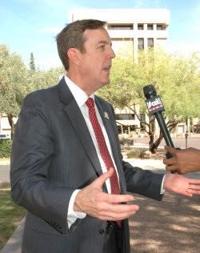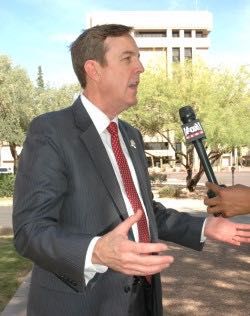PHOENIX — Gov. Doug Ducey won’t debate his Republican foe, with an aide calling Ken Bennett a “fringe” candidate despite the fact he was elected secretary of state in 2010.
But he will have to face him in August, at least on the ballot, if not on TV.
J.P. Twist, who is managing Ducey’s re-election campaign, said the incumbent sees no reason to share the stage with Bennett, pointing out that the two faced off in a multicandidate race for the GOP nomination four years ago. Ducey won the primary — Bennett placed fourth — and later went on to beat Democrat Fred DuVal.
“If Bennett intends to debate, he can argue with himself,” Twist said.
There is no legal requirement for Ducey to do anything other than organized campaign rallies — if even that, given that the governor has the benefit of incumbency and the free media that generates every time he makes a pronouncement.
Ducey also has the benefit of having raised more than $3.3 million so far for the campaign.
That doesn’t count money that others, including the Republican Governors Association and the business-backed Arizona Education Project, already have spent on TV commercials extolling the virtues of what Ducey has done for public education. And Ducey was the beneficiary of a lot of outside funding in his 2014 win.
Only Bennett, who plans to run with public financing — assuming he can get the requisite 4,000 $5 donations — is required by law to debate.
Tom Collins, executive director of the Citizens Clean Elections Commission, said if Ducey doesn’t show for the scheduled Aug. 1 debate, he will have the entire half-hour on public television to answer questions, all without being contradicted by Ducey.
If Bennett qualifies for public funding he will get $839,704 for the primary.
While Twist has dismissed Bennett as a fringe candidate, however, that did not stop Ducey supporters from trying to keep the incumbent from having to face any challenge in the Republican primary.
But that case, originally scheduled for a hearing Thursday, was being dismissed after the attorneys concluded that Bennett, in fact, does have enough valid signatures on his petitions. That sets the stage for the Aug. 28 primary.
Twist is basing the assessment of Bennett as a “fringe” candidate based in part on his comments that if he were governor he would not appoint Cindy McCain to her husband’s seat if the senator died in office or resigned. That sparked an outcry from some quarters of the Republican Party — and from Ducey’s own aides — that it was inappropriate for Bennett to even mention such a thing while John McCain remains a senator while he fights a particularly aggressive form of brain cancer.
But those gubernatorial aides, while lashing out at Bennett, never specifically denied that the governor has considered the idea. And Bennett said his remarks hardly have him out on the fringe.
“Everywhere I go, the vast majority of everybody I talk to agrees that Cindy should not be appointed to replace John when he can no longer serve,” he said.
Twist, however, said that Bennett went over the line in using his vow not to name Cindy at a replacement in a fundraising letter. He called Bennett a “craven opportunist.”
While Ducey is unwilling to show up for a debate, that did not stop Twist, acting on the governor’s behalf, from lobbing some criticism of Bennett’s time as Senate president from 2003 through 2007. He accused Bennett of “carrying Janet Napolitano’s water,” referring to the then-Democratic governor, and calling him a “Napolitano apologist.”
Bennett, for his part, said his record as a “fiscal conservative” has not changed between then and now. And he said the Republican-controlled Legislature did what it needed to do to get the state’s finances in order.
“When I started as Senate president, the “rainy day fund” had $13 million in it, referring to the special account the state is supposed to keep to deal with unforeseen emergencies.
“With Janet Napolitano as the governor, four years later the rainy day fund and ending cash balances totaled $1.1 billion,” Bennett said. He said the state had balanced budgets all four years, all while eliminating “accounting gimmicks” that had been used in the past to make the books look balanced by moving certain revenues and expenses between fiscal years.





